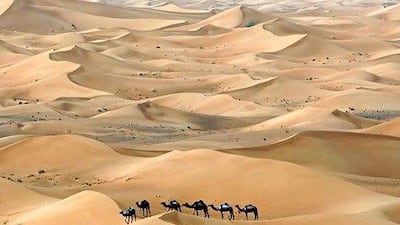Living on the edge of the desert, I observe the shifting of the sands and, on the odd occasion, the camels grazing outside our compound on my way home.
For me the desert has been a part of my life for a few years but it has been an integral part of the local society since the inception of humanity and has been home for thousands of years.
My daily ritual of driving on the desert's edge led me to wonder, "Is there anything we can learn from desert life to impact modern day business?"
For sure the desert has (and does) shaped leaders' behaviours and is connected to modern business practices. Let's explore four of these connections: adaptability, acceptance; resourcefulness; and wisdom.
Every day is different in the desert. The shifting sands create new landscapes and the movement of the sun makes us shift our attitude from trying to avoid scorching heat to lighting a fire to stay warm. Life in the desert forces the inhabitants to adapt to their surroundings to survive.
Because life in the desert is beyond one's control, it is better to accept the rhythm of the sands and move in concert with it. Even the best-made plans constantly change as unexpected visitors arrive, or the weather shifts - including the undesired sandstorm that can last for hours, sometimes even days. Accept what comes and make the best of it.
Life in the desert can be quite difficult for humans. Daily life requires finding and maximising the available resources to meet the needs of the moment.
As a result, desert living has traditionally been nomadic, moving from one place to another rather than settling permanently in one location.
Even though this behaviour is increasingly rare in industrialised countries, it illustrates the need for hunting and gathering, following after seasonally available wild plants and game and searching for the infrequent rains to obtain grazing for livestock.
Just like the desert, modern business in the GCC can be a hostile, potentially deadly environment for the unprepared.
For most of my life, I generally believed wisdom was reserved for the "older" generations. Occasionally, a young person is described as having wisdom beyond their years.
So we know it is possible for young people to have it. But that very phrase reiterates the idea that wisdom is really for our grandparents' and possibly parents' generation.
But is wisdom really reserved for the older generation? Let's ask a different question. Why is it older generations have wisdom? Is it experience? Not exactly. It comes from reflection on experiences. And, unfortunately, most people wait until the autumn of life to reflect.
The practice of regularly going into the desert is traditionally how wisdom has been built in the region. So what is the role of the desert in the development of wisdom? What do you do in the desert? You spend time reflecting. Therefore you can build wisdom by taking regular and frequent time to reflect on the experiences of your busy and active life.
Jump into your Jeep and head out into the desert to take in its power to teach us to focus on the important lessons that can impact your leadership.
Tommy Weir is an authority on fast-growth and emerging-market leadership, an advisor and the author of The CEO Shift. He is the founder of the Emerging Markets Leadership Center

